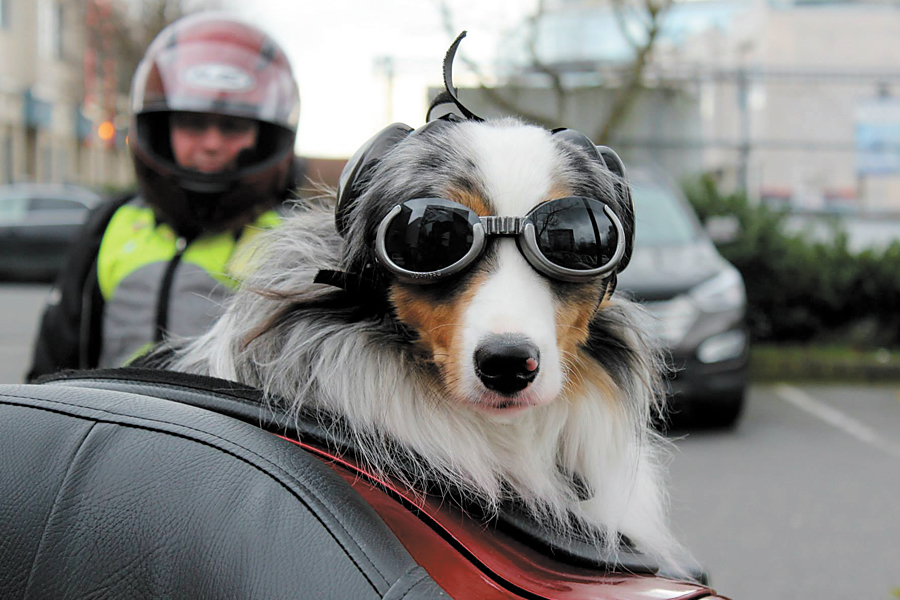Retired sailor turns to new career with Cully the service dog
By Lookout on Mar 15, 2017 with Comments 0

Cully, a four-year-old Australian Shepherd.
Peter Mallett, Staff Writer ~
It is noon at the MARPAC Health and Wellness Expo and the crowd streaming through the Naden upper and lower gyms is robust and noisy.
At one booth in the lower gym an Australian Shepard sits attentively by his owner’s side. Sensing the rise in his anxiety from the activity beyond the booth, the dog gently nudges him, nose to leg. This is the signal it’s time for his owner to take a break and head outside.
The dog, Cully, is a specially trained service dog to (retired) Master Seaman Tyson King. The booth they man together is for VI (Vancouver Island) K-9 Consulting and Training Inc, a business that specializes primarily in training service dogs, and also behaviour reconditioning and obedience.
For King, his service dog is helping him deal with Post-Traumatic Stress Disorder (PTSD) brought on by two back-to-back tours in the former Yugoslavia in the early 1990s that included the Battle of Medak Pocket. At the time, he was a reservist from the North Saskatchewan Regiment. He returned to Yugoslavia in 1996 after his direct entry into the 2 Battalion Princess Patricia Canadian Light Infantry in November 1995. In 1999 he re-mustered to the navy as a marine engineer.
Undiagnosed anxiety, hypervigilance (an acute state of detecting perceived threats) and night terrors slowly engulfed his daily life. His mental illness was finally diagnosed in 2014, 20 years after his last tour.
“Anything can set it off for me but big crowds, loud noises like gun fire, banging, construction zones, fireworks; the smell of rotten meat and walking on grass can sometimes trigger negative reactions from things that happened to me in Yugoslavia,” explains King. “But Cully has been crucial in my going off medication. He instantly recognizes what I’m going through and will nudge me or lick me, tug on my clothing to get my attention, and extract me from these situations.”
Before Cully there was Moxy, a 14-year-old Lab-Collie cross, who stuck by King’s side when the night terrors and anxiety stuck.
Around the same time, King was reading articles and watching television documentaries about service dogs helping people besides the visually impaired.
“I realized that if my dog Moxy had this natural ability then imagine what a fully trained service dog could do,” says King.
He became convinced a service dog could be another kit in his “PTSD tool box” to treat his disorder.
In 2014 King and Cully were united at the Winnipeg-based Courageous Companions, a non-profit run by veterans that pairs dogs with veterans suffering from a variety of conditions. Together, person and canine went through a bonding and training process, and then full certification testing a year later.
The founder of Courageous Companions, George Leonard was so impressed with King’s training and interaction with Cully, he offered him to become a service dog trainer, and so his new career path was forged.
About the training program
He founded VIK-9 Consulting and Training Inc in January 2016. Six months later he left the military.
Service dog training can be as little as $6,500 if the handler has a suitable pet and both are willing and able to be a part of the training program. This program is 40 weeks and takes a pet that is ideally no older than two years of age, fixed, has a significant bond with the handler, and an acceptable level of obedience achieved.
Normal service dog training starts after a minimum of nine to 12 months of service dog task training (imprinting), socialization training, obedience, and public access training. The pairing process immediately follows the successful achievement of public access testing for the dog, with the gradual training of the handler with the dog. After the pairing process is successfully achieved, and the dog is under the full-time care of the handler, then the bonding and team training carries on from six to 12 months before challenging the team certification test. This full process starts at $20,000 for some single disabilities, but more complex disabilities may require more training time and result in higher costs.
Restricted breeds from the VIK-9 program are Rottweiler, Doberman Pincher, Pit Bull, German Shepherd, Mastiff, and Husky Malamute (full or cross breeds) due to their public perceived aggressiveness.
Common breeds for service dogs are Labs and Golden Retrievers due to their lack of protective drives, and easy trainability. However, each dog (any breed outside the restrictions) must be looked at for their own individual personality for suitability of training, says King.
“Some dogs are right for the program and others are not,” he says.
King says current financial support by the Dominion Command Poppy Fund is on hold until a national standard is established for these kinds of service dogs.
“Very little support is available for the general public as many foundations, charities and service dog providers only support veterans,” says King. “VIK-9 is wanting to bridge this gap and be able to provide this training program not only to serving CAF, veterans and retired RCMP, but also to the general public. The need is great and VIK-9 is willing and able to assist in meeting that need.”
VIK-9 is currently seeking charities or foundations willing to support (portion or full) the costs of the service dog training. Once these organizations are identified, King can direct potential clients to the respective organization(s) to apply for funding.
Anyone interested in King’s services should check out www.vik9.ca.
Filed Under: Top Stories
About the Author:





